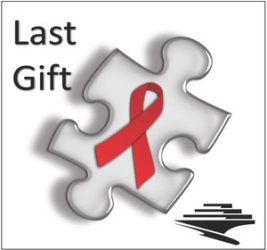Frequently Asked Questions
Download the Last Gift logo in high resolution:
In .pdf format
In .eps format
In .ai format
What is the Last Gift study?
UC San Diego’s Last Gift is a research study committed to understanding the behavior of Human Immunodeficiency Virus (HIV) in the human body by studying participants who are terminally ill.
One of the primary aims of this study is to identify where HIV hides across the human body. This study is intended for eligible individuals who are willing to provide consent to regular blood draws and tissue donation at the time of death.
The study is especially unique because it gives scientists the rare opportunity to learn from organs such as the brain, which is not possible to study with living individuals.
A participant’s legacy will live on and be accessible to researchers for decades after death. Because participants are gracious enough to give back to science at the end of their lives, their efforts are considered their Last Gift to the world.
Who is eligible to participate in the Last Gift study?
People with HIV/AIDS and a life-shortening terminal illness are eligible to participate in the Last Gift study. Terminal illnesses include, but are not limited to: cancer, neurological conditions like Amyotrophic Lateral Sclerosis (ALS), an end-stage organ disease, or other illness that leads to death.
How can someone enroll in the Last Gift study?
Those interested in participating in the Last Gift study can call (619) 543-5000 and ask to arrange a brief (30-40 min) no-obligation screening interview.
Screening interviews are held at UCSD’s HIV Neurobehavioral Research Program (HNRP) facility or at another convenient location. During this visit, individuals and their loved ones will have a chance to ask questions about the study by phone or in-person.
What is expected of Last Gift participants when they enroll in the study?
Once enrolled in the Last Gift study, participants will be scheduled for an initial evaluation. Surveys will be conducted and blood will be drawn during this visit. After this initial visit, our team will be in contact with the enrolled participant on a regular basis to discuss their health status as well as to draw blood, as needed. Our team strives to develop lasting bonds during this time in a participant’s life. If a participant is willing, interviews may also be conducted to help chronicle the experience.
Lastly, loved ones of a participant will be asked to prepare for a rapid autopsy procedure. In other words, the autopsy will have to be performed less than six hours after the time of the participant’s death. This is important to consider as a reality of this study because it might pose as an inconvenience to loved ones during a very delicate time.
What if a Last Gift study participant is too sick, tired or busy to come into the clinic?
Our team understands that individuals with terminal illness may be very fatigued, which is why we will make every effort to accommodate every study participant. This may include traveling to another location, shortening evaluation time, or allowing participants to temporarily forego assessments.
What are the benefits of becoming a Last Gift study participant?
The key benefit of participating in the Last Gift study is knowing you’ve made an invaluable contribution to the scientific community in its effort to find a cure for HIV/AIDS.
In addition, the Last Gift study team meets with participants regularly, which may allow for greater comfort during the end of life.
Is there compensation for the time I spend involved in the study?
Yes, compensation is provided to all eligible participants. For more information on compensation, email lastgift@ucsd.edu.
Can a person participate in the Last Gift study if they do not have HIV?
Yes, a person can still participate in the Last Gift study if they do not have HIV or AIDS. We enroll a limited number of people without HIV who have a life-shortening illness for this study. Specifically using their tissues to study the immunologic and viral dynamic to other viruses, for instance, examining a person’s tissue during or post COVID-19 infection or vaccination to study the immune response across tissues. Contact lastgift@ucsd.edu to learn more.

